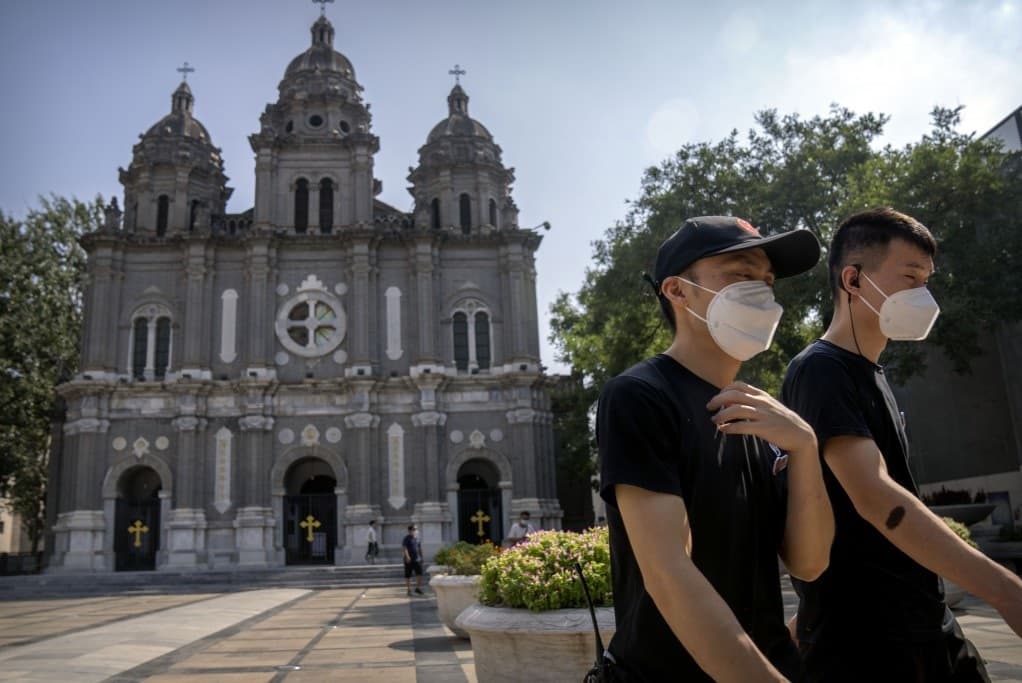ROME – While the Vatican last year issued a rare public criticism of China for appointing a bishop without their approval, it has remained quiet on a similar incident that took place in the past few days, when a bishop was transferred to another diocese without Rome’s permission.
On Tuesday, Bishop Shen Bin, leader of the nearby Diocese of Haimen (Jiangsu), was installed as the new bishop of Shanghai without prior the Vatican’s prior knowledge or approval.
The Diocese of Shanghai has been de facto vacant for the past 10 years, since its Rome-approved bishop, Ma Daqin, was placed under house arrest at Sheshan Seminary in 2012 for resigning from the Chinese Catholic Patriotic Association, the government-approved Catholic body in China, immediately after his episcopal ordination, and he has remained there ever since.
In a statement, Vatican spokesman Matteo Bruni said, “The Holy See was informed a few days ago of the decision of the Chinese authorities to transfer of His Excellency Shen Bin, bishop of Haimen, to the diocese of Shanghai and learned from media of the inauguration this morning.”
“For the moment I have nothing to say about the Holy See’s assessment on the matter,” Bruni said.
Rumors began to circulate in China over the past few days that Shanghai would receive a new bishop, and that Shen would get the job. Shen was ordained a bishop in 2010 and is recognized by the Holy See and the Chinese government since his ordination in 2010.
According to AsiaNews, Shen is considered to be a “rising star” in the Chinese Catholic Church, as he serves as head of the Council of Chinese Bishops – a body linked to the Chinese Communist Party that is not recognized by the Holy See.
For the past month he has also been among 11 Catholic representatives of the Chinese People’s Consultative Political Conference (CPCPCC), which together with other entities is tasked with formalizing decisions made by Chinese President Xi Jinping and other CCP leadership.
After his installation Tuesday, Shen reportedly sent a message on a Chinese messaging app saying he would continue the tradition of “patriotism and love” for the church in Shanghai, and stressed adherence to the principles of independence and self-administration, as well as his commitment to efforts to “Sinicize” Catholicism in China, AsiaNews reports.
His transfer from Haimen to Shanghai without the consulting with or seeking the Vatican’s permission is a direct violation of a provisional agreement on episcopal appointments between the Holy See and China struck in 2018, and which has been renewed twice.
Though the terms of that agreement have never been made public, it is widely believed that it allows the pope to choose candidates from a selection of options put forward by Chinese authorities.
For years, the Catholic Church in China has been divided between a so-called “underground” church loyal to Rome, and a government-sanctioned church operating with official approval.
Despite being widely criticized by Catholics, politicians, and church hierarchs – including 90-year-old Cardinal Joseph Zen, the former bishop of Hong Kong who was tried and charged by a Hong Kong court last year for his pro-democracy advocacy – the Vatican has maintained that its deal with China was intended to unify the church in China, and in so doing, to potentially end the persecution of the underground church.
However, Catholics on the ground have complained of routine violations of the deal, and of the Chinese government using the agreement as an excuse to tear down crosses from churches or to destroy church property.
Shen’s transfer and installation is considered a direct violation of that agreement.
Last fall a similar incident occurred when in November Bishop John Peng Weizhao was installed as an auxiliary bishop for the Diocese of Jiangxi, an ecclesiastic territory recognized by Chinese authorities, but not by the Vatican.
Peng Weizhao was appointed to the papally-recognized Diocese of Yujiang by Pope Francis in 2014, four years before the 2018 agreement. Considered an “underground” prelate not recognized by authorities, Peng Weizhao was arrested and held for six months before being released under strict observation.
Yet on Nov. 24, he joined several state-sanctioned organizations in a ceremony marking his installation as auxiliary for the non-papally recognized Diocese of Jiangxi.
At the time, the Vatican for the first time since striking its disputed deal with China criticized Beijing for violating their agreement, saying in a statement that they learned of Peng Weizhao’s installation with “surprise and regret,” and noting that they do not recognize the Diocese of Jiangxi.
The Vatican said they had received information stating that Peng Weizhao’s civil recognition was preceded “by long and heavy pressure from the local authorities.”
“The Holy See hopes that similar episodes will not be repeated, and awaits appropriate communications on the matter from the authorities and reaffirms its full willingness to continue respectful dialogue concerning all issues of common interest,” they said.
It is unclear whether any communication took place between Vatican and Chinese officials on Peng Weizhao’s installation, and while Tuesday’s installation of Shen in Shanghai is a similar episode, the Vatican has taken the strategy of silence rather than speaking out.
Popes have traditionally taken a concessional approach to China, and Pope Francis himself has long insisted on a long-term strategy of dialogue, in spite of the criticism of the 2018 agreement, saying on his return flight from Kazakhstan last September that “To understand China takes a century, and we won’t see a century.”
When it comes to China, the Vatican has “chosen the way of dialogue,” he said, and pointing to the 2018 deal, said the process is slow “because the Chinese rhythm is slow,” but steps are being made.
Follow Elise Ann Allen on Twitter: @eliseannallen













